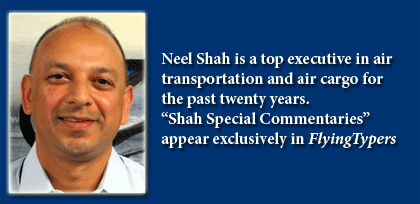Back To The Future

 Early
August carries different meaning depending on where you live in the
world.
Early
August carries different meaning depending on where you live in the
world.
My friends in Europe have probably just
embarked on a glorious month long holiday, while those in Asia are probably
doing the same—but maybe for a week rather than a month! However,
if you live in the southern U.S. and specifically Atlanta, you are getting
ready for the school year, which starts in three short days.
So much for summer!
I thought I would share a few thoughts
with you as we head into the back half of 2014.
One thing striking about 2014 is that
there appears to be quite a nice trend developing on the demand side,
with volumes up rather significantly in all regions of the world.
The sad part is that yields are not increasing
at the same rate, which continues to put an enormous strain on those
operating full freighters. Unfortunately, I don’t believe this
situation is going to change anytime soon, even if volumes continue
to grow at a 5 percent pace, because the influx of new bellyhold space
is creating an incredibly hard ceiling for air freight rates.
This phenomenon will only accelerate into
2015, thus keeping a tight lid on airfreight rates for the foreseeable
future.
WorldACD just published a report that
stated global yields have fallen by 10 percent since 2011 and the only
product sector that has enjoyed a yield increase was Pharma.
There are obviously regional differences,
but there is no denying the macro trends, and yields have a long way
to go before they get back to a level that allows for long term freighter
sustainability. It is no surprise that many long time freighter operators
see the writing on the wall and are making the difficult decision to
divest themselves of the dedicated flying and focus on the money-making
bellyhold operation.
The largest and most stunning of these
reversals comes from AFKLMP, which only five years ago had a business
plan with over 30 freighter aircraft.
Another area where change will continue
to come is at the USPS, where a massive federal bureaucracy is in the
middle of their domestic and international RFP’s for the carriage
of U.S. Mail.
FlyingTypers
published a great piece
on the USPS Procurement process a few weeks ago.
I was very involved in USPS discussions
back in 2009 (as top executive at Delta Cargo) and none of us were too
happy with the outcome, but there really wasn’t much of a choice
in the matter. It is safe to say there was very little “negotiating”
as part of that process back in 2009. Now a new mail contract is being
negotiated against a backdrop of massive losses at the USPS and their
goal of squeezing every possible penny out of their logistics costs.
The airlines shouldn’t look to Congress
for any help because Congress will allow the USPS as much flexibility
as they need when it comes to the procurement of airfreight, because
the only thing the U.S. Congress can agree on these days is new ways
to screw the airlines. Unfortunately, no matter how much they squeeze
the airlines, foreign or domestic, it will be a drop in the bucket compared
to the enormous structural issues imposed by Congress that forbid USPS
from acting like a real business.
Until they figure this out, the airlines
can carry the mail for free and it won’t make one bit of difference
to the USPS’s bottom line.
I would like to conclude by offering a
few words of encouragement to my friend Jan Krems as he begins his journey
up north in Chicago.
He has been given a wonderful opportunity
to turn around one of the most iconic brands in the history of air cargo,
but it will be no easy task.
United Cargo has really struggled to find
its footing since the merger with Continental, and their woes were summarized
by a very difficult cutover to their new UC360 system in July of 2013.
That time period probably represented the trough, and now with Jan at
the helm they have a chance to regain some of their former glory.
 |
The
wonderful thing about Jan is he will bring a great deal of energy and
enthusiasm to the team that will be absolutely contagious.
He has a real instinct for the commercial
side of the business and the respect of the customer base given his
steady hand at AFKLMP for the past 27 years.
This is exactly what United Cargo needs
right now, since a heck of a lot of revenue has escaped over the past
four years. Change will not be easy and progress will come in small
doses, but I have no doubt that United Cargo will be better at the end
of the day.

(Editor’s Note—If
President Franklin Delano Roosevelt (FDR) was a bell in the darkness
from the early 1930s until 1945—not only announcing the light,
but also commanding it with his clear strong messages over American
radio networks—then the voices of excellent air cargo executives
like Neel Jones Shah ring a similar tune, offering a welcome and much-needed
reality check as the air cargo industry moves forward in global transportation.
Neel is Chief Commercial Officer at Able Freight. Mr. Shah, in addition
to a number of other consulting engagements, has also just signed a
long-term agreement to advise the CEO of Sendum Wireless, as they begin
their push into global GPS solutions for the air cargo industry. This
autumn Neel’s busy travel calendar includes Fruit Logistica in
September, followed by TIACA in October, where he will be involved helping
out “with a couple of the workshops.”)






